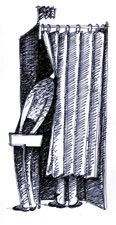
Amity Shlaes
Polling is more accurate when 'voters' are asked to put their money where their mouths are
http://www.jewishworldreview.com -- One of the best known features of American polling is the famous "convention bounce" --- the boost a candidate is said to get following his party's multi-million dollar display of fealty. The bounce itself is nearly always temporary, but the copy-desperate media tend to hype it. Thus this week any number of TV and print types are making much of the fact Mr Gore's "I'm My Own Man" speech in Los Angeles gave the vice president a slight edge over Mr Bush in most opinion polls.
Most, but not all. A little-known survey known as the IEM showed George W. Bush maintaining his earlier lead in the presidential contest.
The Iowa Electronic Market, as it is officially called, is an electronic futures market that allows players to buy and sell $1 futures contracts on political races. Contracts on Mr Bush were trading at 53 cents this week, redeemable at $1 should Mr Bush win come November. This compares with 47 cents for Gore contracts. In the closely-watched New York Senate Race, Hilary Clinton boasts a 5 cent lead on Republican opponent Rick Lazio. Next week IEM plans to introduce contracts on the Green Party's Ralph Nader.
The market was established in the Land of Futures, the agricultural Midwest. Professors at the University of Iowa's Henry B. Tippie College of Business created the IEM as a learning tool for students, but it is also interesting to grownups for several reasons.
The first is that it seeks to plumb some big economic theories - rational expectations, efficient markets - and see whether markets are better judges of political reality than opinion polls.
 |
Unlike the "one man, one opinion" opinion polls, the IEM allows its "voters" to "vote" more than once if they choose by buying more than one contract. In other words, they must put their money where their mouth is, a contrast with the usual polling arrangement.
The theory here is that well-informed players will invest more heavily, knowing they are right, and uninformed players will diminish their exposure. The result - again, in theory - ought to be a more accurate poll.
The Business College requires its students to invest in the IEM. But non-students may also enter the website and buy contracts. (Yes, you can play in this market even if you live in Europe or Asia, and no, there is no buying on margin). The system differs from gambling, or the sort of betting that goes on in the UK at Ladbrokes, in that participants may sell their contracts any time they chose, even before the relevant event (the election) takes place.
The IEM model is so close to a real futures market that it has been copied across the globe. An Austrian enterprise used the Iowa software to start up a similar project in Vienna, which was then emulated in Germany, for a time, with a site known as "WahlStreet" ("Vote Street").
All this makes the IEM something of a rarity in the world of American polling. Even votedaq.com, an online game that allows players to buy and sell shares in political candidates, does not involve spending real money - voters are assigned virtual money, and play for the chance to win prizes, including a $250 award for having the best portfolio, according to the owners.
But what about the accuracy? Forrest Nelson, one of the professors who established IEM four presidential elections ago, says that having the reality check of real cash really does make his voters less volatile - the IEM has rarely displayed a bounce.
Indeed, the IEM has a pretty good track record. From June to mid-October 1996, for example, the IEM data indicated that Bill Clinton would be re-elected with a margin of victory of between seven and 11 percentage points. During the same period, the big media-based polls were predicting a much more dramatic victory, with Clinton leads as wide as 38 percentage points and averaging about 20 points. Mr Clinton's actual lead was 9.4 percentage points, close to the early IEM signals.
To be sure, the IEM is a thin market - some 6,200 players have a total of $146,500 invested in IEM accounts. But it will probably grow - by November 1996, days before the Dole-Clinton contest was decided, investors had $213,000 in the IEM. Still, it remains a useful indicator, and might be even more popular if it were allowed to advertise. (Advertising is banned, one of the conditions the IEM accepted to stay in the good graces of the US commodities regulator, the Commodity Futures Trading Commision. To keep the CFTC tolerant, the IEM also limits players' investment to $500.
Not that it's impossible to make or lose real money from Election 2000. Mr Gore's "bounce"
speech included a call for government-provided prescription drugs for senior citizens.
Depending on one's view of what that would mean for drugs companies, and his prospects
of beating Mr Bush, a brave investor might go long or short on these
JWR contributor Amity Shlaes is a columnist for Financial Times
. Her latest book is
The Greedy Hand: How Taxes Drive Americans Crazy and What to Do About It. Send your comments by clicking here.
08/21/00: "I Goofed"
08/16/00: Part of the union, but not part of the party
08/09/00: Silicon Alley Secrets
08/02/00: Radical Republicans warm up for Philadelphia
07/31/00: I'll Cry if I Want To
07/27/00: Cold warrior of the new world
07/25/00: The Estate Tax will drop dead
07/18/00: Shooting down the anti-missile defence myths
07/14/00: A convenient punchbag for America's leaders
07/07/00: How to destroy the pharmaceutical industry
07/05/00: Patriots and bleeding hearts
06/30/00: Candidates beware: New Washington consensus on robust growth stands the old wisdom on its head
06/28/00: White America's flight to educational quality
06/26/00: How Hillary inspired the feminist infobabes
